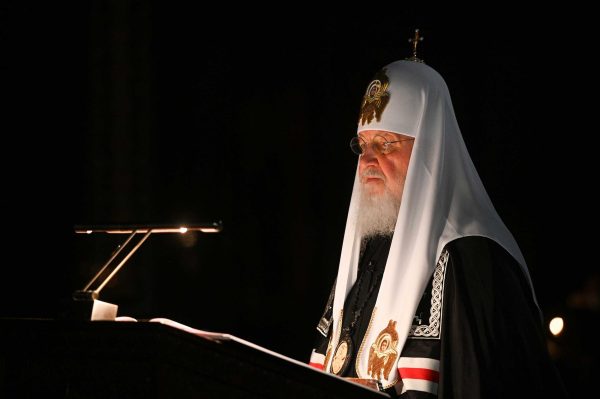On the evening of March 17, 2021, on the Wednesday of the first week of Great Lent, His Holiness Patriarch Kirill of Moscow and All Russia performed Great Compline with the reading of the Great Canon of Repentance of St. Andrew of Crete at the Cathedral of Christ the Savior in Moscow. At the end of the service, His Holiness Patriarch Kirill delivered the following sermon:
“In the name of the Father and of the Son and of the Holy Spirit!
In the prayer of Saint Ephraim the Syrian we ask the Lord to grant us the spirit of humility. The word “humility”* is a complex word that includes two concepts – “wisdom” and “humility.” And if a person who is far from Christianity thinks about this word, he will find a contradiction in it, since outside the circle of Christian values humility is not a positive quality. Humility equates with weakness, a humble person looks like a failure or even like a madman. It is enough to recall Dostoevsky’s wonderful novel The Idiot. On the pages of this work the image of a Christian, the purest image of a humble person, is brilliantly created. But how was this humble person perceived by the society around him? As if he was crazy. Indeed, for a non-religious person, for non-Christian consciousness, humility is a manifestation of weakness or even inadequacy.
However, the very combination of two concepts – “humility” and “wisdom” – in the word “humility” testifies to the fact that in our Christian tradition humility is identified with strength. Wisdom, like knowledge, is power. No one dares to refute this truth. A wise person is strong in his mind. The mere word “humility”, which unites two seemingly opposite concepts, is a wonderful interpretation of what true humility is. True humility is a display of Divine wisdom. And everything Divine is so superior to human understanding that people who do not think about lofty truths are unable to comprehend them. So it turns out that for the majority, humility is not a value, but only a manifestation of weakness. But the Lord directly points out to us that humility is power.
In order to experience whether this is so, one must go through a very long and difficult path of acquiring genuine humility. Some extatic people try to acquire this virtue as quickly as possible, but they fail to do anything except [for suffering from] a nervous strain. One needs a gradual ascent to the degrees of spiritual development in order to feel what great a power humility can be. Probably humility is at the very last steps of this path. True meaning and true strength of what Christian humility is are found there, on those spiritual heights.
St. John Chrysostom remarkably said that there is no other power that can lift us to heights, but only humility. If a person wants to achieve perfection, if he really wants to achieve much in his spiritual life, then he, undoubtedly, must find humility not in words, not as a behavioral characteristic, but as a true state of mind.
Great Lent, which immerses us in prayer, in listening to the word of God, should immerse us in reflection. Sometimes such pious reflections are possible during worship, because our mind and memory are not always able to keep track of everything that is read or sung in the temple. Involuntarily, the thought goes beyond the boundaries of the temple, and we think about other things. But it is better to ponder on what can help us in the work of our salvation, instead of thinking about worldly matters. Perhaps the most important thing for all of us would be to realize fully what humility is, which is united with wisdom, what kind of power it is, which in one word “humility” is put to the same level as wisdom, which undoubtedly gives power to a person. If wisdom has such power, then humility has the same power. It is very important to realize that humility is not weakness, not some kind of inferiority, not artificial foolishness, as sometimes it happens, unfortunately, in painful religious practices, but it is a real spiritual force that can not only bring us closer to salvation, but also give us great wisdom in our behavior, in our actions, in our words, and in our communication with people, both who are close and far. May the Lord help us in the days of Holy Lent to acquire humility to the best of our ability – the great power that gives a person the opportunity to walk the path to salvation. Amen.”
*The Russian word is ‘smirenomudrie’, which consists of ‘smirenie’, i.e. humility, and ‘mudrost’, i.e. wisdom.

















